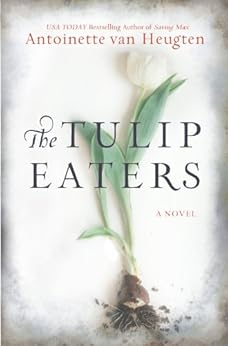Since I
started by blog, I’ve done an annual Advent Book Calendar highlighting books I
have enjoyed and authors I really like.
This year I thought I’d do an Advent Book Calendar with a twist; for
each day leading up to Christmas, I’m going to post a review of a book to which
I’ve given only one star (Throw a book at this one) or two stars (Don’t put this book in your book bag). Though I would not recommend these books,
others have disagreed with me. Each
book, on Goodreads, has received a 3 or 4 Star average rating.
Review of The Tulip Eaters by Antoinette van
Heugten
1
Star
The novel
begins in 1980 in Houston, Texas. Nora de Jong returns home to discover that
her mother Anneke has been murdered and her daughter Rose has been kidnapped.
An unknown man also lies dead. Dissatisfied with the pace of the investigation,
Nora sets out to find her daughter. Soon she is in Amsterdam investigating her
parents’ activities during WWII in The Netherlands since those activities seem
to be connected to the murder and kidnapping.
My husband
spent his teen years in The Netherlands and part of his family still lives
there so I am always attracted to books with a Dutch setting. The novel’s
historical information about the Nazi occupation of that country is certainly
interesting and matches my mother-in-law’s descriptions of life in that period.
Unfortunately, besides the historical aspect, I found little to like about the
book.
The major
problem is the lack of realism in the behaviour of the characters. For example,
the police who arrive on the crime scene at the beginning are totally
unprofessional. It is highly unlikely that police would allow Nora and a friend
to be present during the examination of the crime scene or that they would not
check a body for identification. The police believe that the dead man was
Anneke’s killer but then make statements like, “if the killer wore gloves”?
They don’t know if he did? One policeman says, “It appears that there was a
struggle and movement on the staircase . . . and other footprints in the entryway
and dining room.” What would indicate movement had occurred on the stairs?
Footprints are found inside the house? The lead police investigator offers to
help Nora hire a private detective, adding they “Used him before.” The police
are in favour of a ransom being paid should it be demanded?
The police
are not the only ones who behave unrealistically. Ariel manages to follow his
father from Amsterdam to Houston and arrive just in time to witness a crucial
event. Though he had never been to Houston, he has no difficulty navigating
around the city and “drove as fast as he could toward the airport”? Though
wounded by a gunshot and bleeding, he is able to escape authorities when he
disembarks from a ferry – an escape that is never described.
There are
several such gaps, as if the author could not figure out how to get a character
out of a bind or have him/her learn something significant and so chose to leave
events unexplained. One character says, “- and I have no idea how” and another
says, “I never knew how he did it.” Twice, Nora’s hotel room number is divulged
for the sake of expedience.
Characters
have very convenient professions. Ariel works in immigration at the airport and
coincidentally is the one who admits Nora into The Netherlands. (Do American
passports include street and city addresses on them?) Nico, Nora’s love
interest, just happens to be the director of a facility which houses documents
from WWII and so can assist her in her investigation. Nora herself is a
pediatric surgeon and apparently an exceptionally gifted one since she
speculates how “oncologists dealt with death of their patients.” Nonetheless,
she is fired from her job because she takes too much time to deal with the
death of her mother and the kidnapping of her daughter? Nora’s grandfather was
“a respected physician” but he was also “adept at ferreting out hiding places
because he was so familiar with the city’s buildings”?
There are
other gaps of logic. Henny, a WWII survivor, supposedly lost her husband,
though there is no reference to her ever having married. Henny speaks of the
Nazis taking “everyone in my family except me,” but the reader soon realizes a
brother and sister of hers also survived. One of the villains overhears a
conversation between Nora and Nico and then tells his boss that Nico’s surname
is Meijer, even though Nico’s surname is never mentioned in that conversation.
A character turns “down a narrow, dark alley” where she is attacked and her
attacker “dragg[ed] her quickly into an alley.” The kidnapper changes Rose’s
name to Jacoba but continues to call her Rose? A daughter argued “with [her
father] constantly about his hatred of the Jews” but then he never questioned
her joining the NSB which collaborated with the Nazis occupying The
Netherlands?
Dialogue is
unrealistic. One friend would not say to another, “I didn’t see you two that
often, you know. I was busy working on my thesis on the effect of European
economics on the Netherlands . . .” when the thesis topic has no relevance. Two
Dutch people agree on a payment: “she’d given him the two grand up front.” Is
that guilders or American dollars? And would anyone actually describe a couple
as “Lovers such as the world has never seen – before or since”?
It was
disappointing that there are so many problems with this novel. The lack of
realism is impossible to overlook. The book needs much editing including a
change of the title which really does not indicate the true content.
Note: I
received an ARC of the book from the publisher via NetGalley.

No comments:
Post a Comment